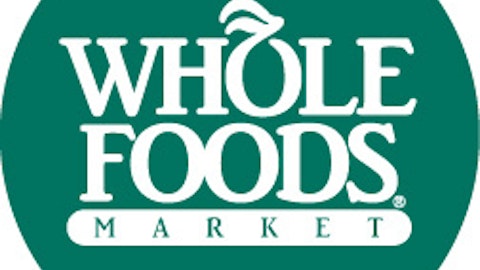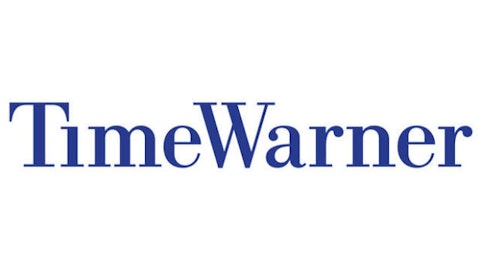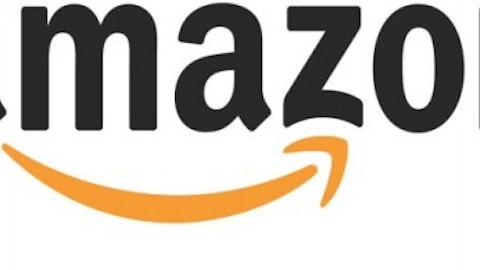
What does this expansion mean for Amazon.com, Inc. (NASDAQ:AMZN), and what does it mean for companies like Wal-Mart Stores, Inc. (NYSE:WMT), Whole Foods Market, Inc. (NASDAQ:WFM), and Costco Wholesale Corporation (NASDAQ:COST)?
What Amazon Fresh means for Amazon
Amazon’s quest to grow revenue and ignore profits continues. The grocery delivery business is a graveyard of failed companies, with margins razor-thin and competition fierce. But if any company is capable of delivering groceries in a sustainable way, it’s Amazon.
Amazon has been extremely slow and cautious with the expansion of Amazon Fresh, largely due to the tough economics of the business. In the short-term and intermediate-term Amazon.com, Inc. (NASDAQ:AMZN) Fresh will have little effect on the company’s results due to the limited footprint, but if new markets prove successful Amazon Fresh could eventually bring in billions of dollars in revenue.
The problem is that Amazon Fresh only makes sense for people who can afford to not only pay more for their groceries but also the $299 annual fee. This excludes, I think, a significant fraction of the American population. And considering that Amazon Fresh only makes sense in densely populated areas, there’s a limit on how expansive the service can become.
Just running a grocery delivery service at break-even is extremely difficult, so it’s unlikely that Amazon will derive much profit at all from Amazon Fresh, now or in the future. The return on investment here is terrible, and investors should be concerned.
What Amazon Fresh means for Wal-Mart
I think it’s safe to say that people who grocery shop at Wal-Mart Stores, Inc. (NYSE:WMT) do so because of the low prices. Wal-Mart uses its grocery business to give shoppers a reason to visit its stores more often, leading them to buy other higher-margin goods. Wal-Mart has taken a big chunk of the grocery market from traditional grocery stores and is unlikely to lose that share to a grocery delivery service.
Many people can’t afford to pay $299 for access to a grocery delivery service which then costs more than brick and mortar groceries. There is likely no overlap at all between Wal-Mart Stores, Inc. (NYSE:WMT) shoppers and possible Amazon.com, Inc. (NASDAQ:AMZN) Fresh members, so even if Amazon Fresh becomes widespread Wal-Mart will not be affected.
What Amazon Fresh means for Whole Foods
Whole Foods Market, Inc. (NASDAQ:WFM) carries the most risk of losing customers to Amazon Fresh, given its high prices and upscale products. But going to Whole Foods is an experience, one which many shoppers wouldn’t want to give up for convenience. In Austin, TX, where the flagship Whole Foods store is located (and where I reside), Whole Foods Market, Inc. (NASDAQ:WFM) is a tourist destination. Many people go there for lunch at the cafe or get take-out from the buffet-style prepared food selection. Calling Whole Foods a grocery store is a vast understatement.
Whole Foods could lose some customers to Amazon.com, Inc. (NASDAQ:AMZN) Fresh, but I think the losses will be minimal. The idea of having meat left outside your door is a little strange, and most people prefer to choose their own produce at the store. Grocery delivery may be appealing for some types of items, but I doubt Whole Foods will be greatly affected.
What Amazon Fresh means for Costco
Costco Wholesale Corporation (NASDAQ:COST)’s business model is vastly different than its competitors. The company charges an annual membership, about $55, and then prices its products around 15% above cost. Almost all of Costco’s profits come from the membership fees, and this allows Costco to have extremely low prices.
You could argue that Amazon.com, Inc. (NASDAQ:AMZN) is attempting the same type of model with Amazon Fresh, but that would require the service itself to at least break even. This is unlikely given the delivery overhead, something that Costco doesn’t have to deal with.
To some degree Costco Wholesale Corporation (NASDAQ:COST) is an experience, although not to the same degree as Whole Foods. People like shopping at Costco, something that is rarely said of traditional supermarkets. The low prices pay for the membership very quickly, and socially conscious shoppers appreciate that Costco pays high wages to its employees. And with a high membership renewal rate a Costco membership is extremely sticky. Amazon Fresh will not put a dent in the Costco Juggernaut.
The bottom line
Grocery delivery is a strange business. The market seems small, as people who shop at traditional grocery stores or chains like Wal-Mart care more about price than convenience. The target market appears to be the higher-end shopper who frequents Whole Foods or privately held Trader Joe’s, but it’s questionable whether or not convenience would trump the benefits that these types of stores offer. And environmentally it seems that door-to-door grocery delivery has a much larger carbon footprint than other options, potentially turning people off from the service. I don’t think that Amazon Fresh will revolutionize anything, instead being just another profitless business for Amazon.com, Inc. (NASDAQ:AMZN).
The article A Fresh Idea From Amazon? originally appeared on Fool.com and is written by Timothy Green.
Timothy Green has no position in any stocks mentioned. The Motley Fool recommends Amazon.com, Costco Wholesale, and Whole Foods Market (NASDAQ:WFM). The Motley Fool owns shares of Amazon.com, Costco Wholesale, and Whole Foods Market. Timothy is a member of The Motley Fool Blog Network — entries represent the personal opinion of the blogger and are not formally edited.
Copyright © 1995 – 2013 The Motley Fool, LLC. All rights reserved. The Motley Fool has a disclosure policy.




